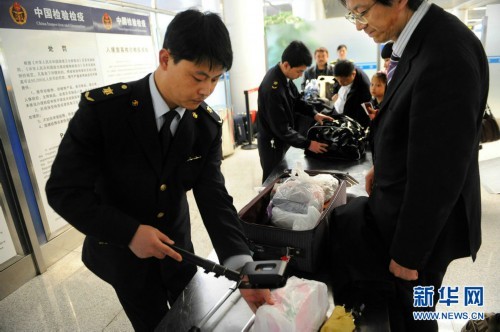China remains unaffected by radioactive leaks
China will remain unaffected by radioactivity from Japan's Fukushima Daiichi Nuclear Power Plant over the next three days, according to the latest analysis on Wednesday, Xinhua News Agency reported.
 |
|
Chinese inspection and quarantine officers conduct radioactive detections for passengers back from Tokyo, Japan on March 16, 2011. |
The?National Nuclear Emergency Coordination Committee said in a statement that the accident has not had any impact on China's environment or the Chinese public's health.
As radioactive materials spread towards the waters east of Fukushima, then reach southeast Pacific waters, China will not be affected over the next three days, according to a weather forecast at 4 p.m. on Wednesday from a Beijing-based emergency response center affiliated with the World Meteorological Organization and the International Atomic Energy Agency.
Further, the State Oceanic Administration detected no abnormal radiation in the waters off the Chinese coast and concluded that China's waters will not be affected by radioactive leakage in the next three days as the currents off the coast of Fukushima slowly flow southeast.
Meanwhile, the Ministry of Environmental Protection said that the air monitoring across the country continues to show normal radiation levels, according to the statement.
The crippled Japanese nuclear power plant was damaged by a 9.0-magnitude earthquake and a tsunami on March 11.
Radiation in Tokyo water
According to China Daily's report, many shops in Japan's capital ran out of bottled water on Thursday after a warning of radiation danger for babies from a damaged nuclear plant where engineers are battling the world's worst atomic crisis since Chernobyl.
Nearly two weeks after the earthquake and tsunami that battered the Fukushima complex and devastated northeast Japan, Tokyo's 13 million people were told not to give infants tap water where contamination twice the safety level was detected.
The Japanese government urged residents not to panic and hoard bottled water - but many shops quickly sold out.
"If this is long term, I think we have a lot to worry about," said Riku Kato, father of a one-year-old baby.
Radiation levels above safety norms have also been found in milk and vegetables from the area around Fukushima, 250 km (150 miles) north of Tokyo.
The United States, Hong Kong and Australia have restricted food and milk imports from the zone, while Canada became the latest among numerous nations to tighten screening.
Radiation particles have been found as far away as Iceland, though Japan insists levels are still not dangerous to adults.
China did not turn away Japanese cargo plane
Earlier media reports said a Japanese cargo plane of All Nippon Airways arrived at Dalian, a port city in northeast China's Liaoning Province, on March 16 from an airport near Tokyo. But it was denied entry due to excessive radiation detected from its cargo, according to Xinhua News Agency
A spokesman with Liaoning Entry-Exit Inspection and Quarantine Bureau said on?Thursday that the plane insisted to leave because of a tight schedule while the customs were carrying out standard procedures involving radioactive goods.
Dalian Entry-Exit Inspection and Quarantine Bureau reported to higher authorities after detecting excessive radiation from the container. The bureau was waiting for further notice when the plane took flight, the spokesman said.
The plane left at 5:30 pm, three hours after it landed Dalian.
The spokesman said the container's radiation level was measured at 2.2 micro sievert per hour, or 22 times higher than normal.
According to International Atomic Energy Agency regulations, customs authorities are entitled to take proper actions on goods with radiation levels two times higher than normal, he added.
 0
0 






